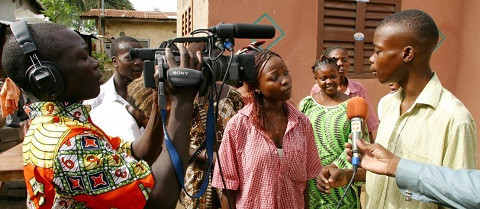
GCED Basic Search Form
Quick Search
أنت هنا
الأخبار

Youth and Digital Transformation
Youth are at the forefront of the digital transformation. A look into the minds of youth today can give us a glimpse into our world 20 years from now. UNESCO is fully aware of this reality and the often-understated opportunity to empower youth for change.
According to ITU, the proportion of young people aged 15-24 using the Internet is significantly higher than that of the total population. High access to information provides a host of opportunities for youth engagement, leadership for change, and entrepreneurship. This is assuming that they have adequate media and information literacy (MIL) competencies.
On the other hand, youth are also exposed to disinformation, online hate speech and violent extremism more frequently than other age groups. As a vulnerable and active group, it is imperative that youth acquire the knowledge and skills to effectively and wisely engage with information, media and technology in the ultra-mediated world where we live.
Acquisition of MIL competencies can sharpen youth’s critical thinking, facilitate the expression of their voices, and enhance their engagement in democratic discourses. When youth are media and information literate, they can better capitalize on the benefits offered by the digital age. They also become more resilient to the negative effects.

Youth are Co-leaders and Co-creators of MIL for All
Peer education is instrumental in empowering youth with MIL. This is the rationale behind the Youth Committee of the UNESCO-led Global Alliance for Partnership on Media and Information Literacy (The MIL Alliance). Started in 2016, and led by a group of young professionals and activists from different countries working in fields related to MIL, the actions of the MIL Alliance Youth Committee have been supported by the Multi-Donor Programme on Freedom of Expression and Safety of Journalists.
Youth organizations are at the core of the endeavour. UNESCO has enhanced the capacity of over 140 youth organizations, more than half of which are from Africa, to integrate MIL into their institutional policies and operation. Through the MIL Alliance Youth Committee, youth organizations and networks around the world build synergies at regional, national and local levels. Collectively, they are contributing to the MIL development agenda, by replicating good practices in different regions and forging multi-stakeholder partnerships.
Through the annual Global MIL Week Youth Agenda Forum, youth leaders dialogue with policymakers and MIL stakeholders, and showcase their ideas and achievements. The annual Youth Agenda Forum is co-led by UNESCO and the MIL Alliance Youth Committee.
During the 2019 edition in Gothenburg, Sweden, youth organizers and participants drafted and adopted a Youth Open Letter to Heads of International Development Organizations and States, urging decision makers to put MIL on their development agenda. The 2020 edition will again involve youth as co-leaders in the planning process. Global MIL Week 2020 will respond to the present COVID-19 Pandemic. It will focus on peer education to expand MIL access to all including youth, under the theme Resisting Disinfodemic: Media and Information Literacy for Everyone and by Everyone.

Youth Responses to the COVID-19 Pandemic
The COVID-19 pandemic entailed an unprecedented “disinfodemic” blending disinformation, misinformation, conspiracy theories, and information overload. The urgency for MIL for everyone and by everyone echoes across the world. Youth leaders shouldered the responsibility for MIL peer education alongside their senior counterparts.
“No time than now has MIL been more relevant for the world and young people. The MIL Alliance Youth Committee responded to the call to combat a pandemic and an infodemic; we seized every possibility to do it even in the face of limited resources”, said Daniel Nwaeze, the global coordinator of the MIL Alliance Youth Committee.
Witnessing the widespread repercussions of the “disinfodemic”, the MIL Alliance Youth Ambassadors took prompt measures to ensure their peers are appropriately equipped to tackle the challenges. These include:
- promoting and hosting a series of webinars on various MIL-related topics within the framework of the UNESCO MIL Alliance response to COVID-19;
- engaging volunteers from around the globe in the development, translation, and dissemination of a COVID-19 verified information guide;
- developing a database of reliable information sources on COVID-19 in over 70 languages.
UNESCO joins WHO to bolster youth actions combatting COVID-19
The MIL Alliance Youth Ambassadors are also involved in the joint WHO and UNESCO international webinar and other related actions to celebrate International Youth Day. The webinar under the theme “Youth Engagement for Global Action” will take place on 12 August, from 12:30 to 14:00 (CET). Register for the webinar here. For more information about the webinar, please visit: https://on.unesco.org/3a3EBzC.
In the pursuit of a media and information literate citizenry and society, youth participation in MIL actions is growing across platforms, institutions, and frontiers. Nonetheless, more young people need to be part of this effort, to facilitate and accelerate this long but important process. For more information on how to get involved or to explore partnerships, contact Alton Grizzle, a.grizzle@unesco.org(link sends e-mail) and Xu Jing, ji.xu@unesco.org(link sends e-mail).
URL:
https://en.unesco.org/news/youth-needed-leaders-universal-access-media-and-information-literacy
